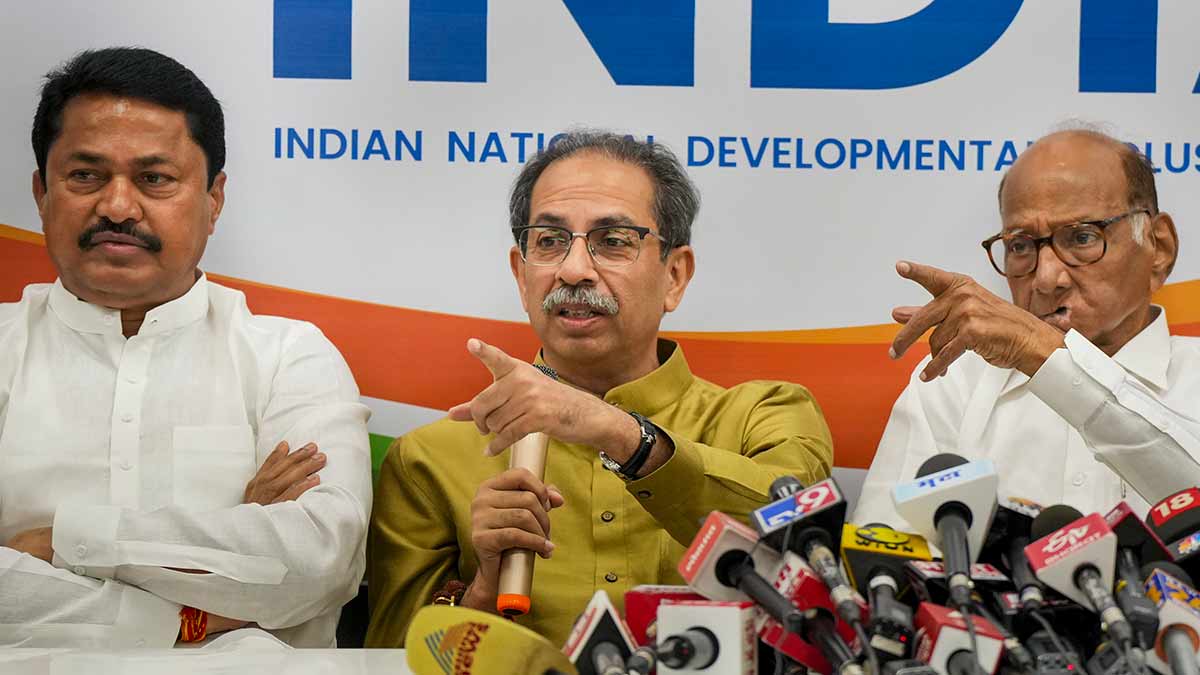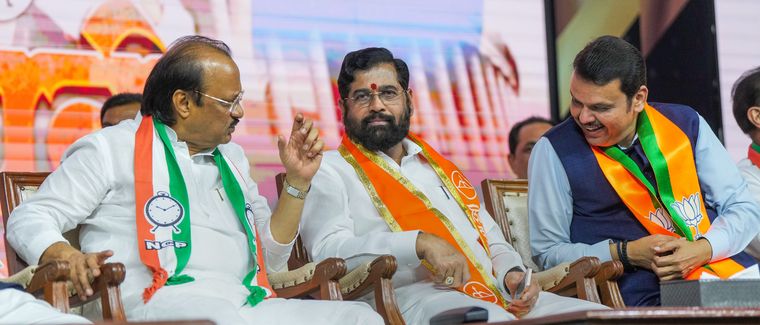A couple of weeks ago, Uddhav Thackeray, president of the Shiv Sena (UBT) gave a fiery speech to party workers in Mumbai, in which he initiated a no-holds-barred attack on the BJP and Deputy Chief Minister Devendra Fadnavis. “Either I will finish you [politically] or I will get finished,” said Uddhav, indicating that his attacks on the BJP and the Mahayuti government are going to become fiercer as the assembly polls, scheduled to be held in October, gets closer.
In another rally, at Pune, Uddhav called Union Home Minister Amit Shah a political descendent of Afghan king Ahmad Shah Abdali, who defeated the Marathas in the Third Battle of Panipat in 1761. This comment was a retort, probably, to how BJP leaders describe Uddhav―Janaab Uddhav and follower of Aurganzeb.
The opposition Maha Vikas Aghadi, comprising the Congress, the Shiv Sena (UBT) and the Nationalist Congress Party (Sharadchandra Pawar), is high on aggression following its success in the Lok Sabha elections, when it won 30 of 48 seats. This translates to 160 assembly segments (the Mahayuti―the BJP, Chief Minister Eknath Shinde’s Shiv Sena and Ajit Pawar’s NCP―was ahead in the remaining 128).
The result evidently boosted the confidence of the MVA leadership. The Congress and the Shiv Sena (UBT), especially, are saying “this (Shinde) government has just two months left”.
Fadnavis has urged his party’s workers to work hard for two months to ensure that the saffron alliance wins 200 seats. Shinde and Pawar, too, are telling karyakartas that their government has a good chance of returning to power.
It is clear that the next assembly election will be a fight to the finish. The stakes are high for Uddhav and Aaditya Thackeray and Sharad Pawar and his daughter Supriya Sule as they will have to once again prove that their parties are the original Shiv Sena and NCP, respectively.
Satyajeet Tambe Patil, an independent member of the state legislative council, said that the aspirations of political activists have become huge and a lot will depend on how tickets are distributed. “I will not be surprised if this election turns out to be like what happened in 1995 when independents got elected in big numbers and were crucial in the formation of the first Shiv Sena-BJP government,” he said. “Powerful party workers who are upset that they did [not get a ticket] could contest as independents. This can happen across all six parties.”
It is too early for seat sharing agreements to be finalised. However, a Shiv Sena (UBT) office bearer said that his party and the Congress are likely to contest 100 seats each while the NCP(SP) will get 80 seats. The remaining eight seats will be given to other friendly parties.
“Post the Lok Sabha elections, the atmosphere is conducive for an MVA victory,” said Harshal Pradhan, Shiv Sena (UBT) spokesperson and long-time media secretary to Uddhav. “People voted in large numbers for the Shiv Sena (UBT). Uddhav ji‘s popularity increased. In fact, the MVA won 30 seats because of Uddhav ji’s extensive campaign. So, our estimate is that we are ahead in around 180 assembly segments. We want seat sharing to be done on the basis of which party is more powerful in each constituency. It is most likely that our sitting MLAs will retain their seats.”
Pradhan argued that Uddhav alone could be the MVA’s face in Maharashtra. “It makes a big difference when you have a face that can be projected as chief minister,” he said. “People have seen Uddhav ji work as chief minister for two and half years, they know how he successfully fought Covid-19 and was praised by all. People trust him immensely. He is kutumb pramukh (head of family) of Maharashtra.”
In early August, Uddhav spent three days in Delhi to meet the leaders of the INDIA alliance, something unheard for a Thackeray. The Mahayuti termed this as kneeling before the Congress and INDIA and begging to be made chief minister if the MVA won.
Shiv Sena (UBT) allies, however, are not ready to declare anyone as the face of the MVA alliance. Sharad Pawar and most Congress leaders are of the opinion that the decision can be taken later on the basis of seats won by each party. There is a strong feeling in the Congress that it has a chance to become the single largest party given its showing in the Lok Sabha polls, when it won 13 seats. Its leaders, like state president Nana Patole and chief of legislative party Balasaheb Thorat, have chief ministerial ambitions. “Patole’s supporters even put up hoardings declaring him as a future chief minister,” said Pradhan. “This is not good; this can create a rift in the alliance. We have never done this.”
Pradhan may have a point, but the Congress is firm there will be no chief ministerial face in the assembly elections. “The MVA alliance is the face,” its leaders insist to the media consistently. The party’s state in charge for Maharashtra, Ramesh Chennithala, spoke of the MVA securing two-thirds majority. Chennithala and senior state leaders like Patole, Thorat, Satej Patil and Vijay Vadettiwar plan to visit all the 36 districts to select promising candidates and make the organisation battle-ready.
The NCP(SP) is not far behind. It has released its black book of allegations of misrule by the Shinde government. The party launched the Shiv Swarajya Yatra on August 9, which will cover the entire state, but focus on strongholds in western Maharashtra and Marathwada. While it is a given that the NCP(SP) is going to select its candidates on merit, it is also open to welcoming worthy candidates from the rival alliance.
A case in point could be the Kagal constituency in Kolhapur district. BJP bigwig and Kagal royal family member Samarjeet Ghatge, who is seen as close to Fadnavis, is said to be considering joining the NCP(SP) as his traditional rival, Hasan Mushrif, from Ajit Pawar’s NCP, is now part of the cabinet. The Mahayuti has decided that Mushrif will retain the seat. In the last election, Mushrif had trounced Ghatge, who contested as an independent. THE WEEK’s attempts to reach Ghatge did not succeed. An aide who answered his phone, however, vehemently denied the speculation of him switching sides and said that Ghatge will respond soon. A leader from the NCP(SP), too, said that it was too early to confirm anything.
In the Mahayuti, the BJP wants to contest 150-160 seats while the remaining could be divided between Shinde’s Shiv Sena and Ajit Pawar’s NCP. The BJP has put Fadnavis in charge of the campaign and candidate selection. Fadnavis, who had expressed his desire to step down after the setback in the Lok Sabha polls, was told by the party to work towards winning the assembly elections. A motivated Fadnavis is all geared up for a do or die battle. He is even learnt to have defended the decision to ally with Ajit Pawar’s NCP to the RSS top brass.
Shinde’s Shiv Sena has appointed observers in over 100 constituencies. Its leaders have reportedly told Shinde that the party should contest a minimum of 100 seats. He is planning to appoint thousands of ‘yojana doot’ (messengers) who will convey the good work done by his government to the voters, including mega infrastructure projects, schemes like Ladki Bahin and Ladka Bhau and free electricity to farmers.
Ajit Pawar’s NCP launched its Jan Surajya Yatra on August 8, a day before the NCP(SP) launched its yatra. As the yatra travels through districts, Ajit Pawar, who holds the finance portfolio, is telling voters that he has sanctioned thousands of crores for welfare and development projects. However, there is the possibility that certain legislators who are with Ajit Pawar could switch to the NCP(SP) if they sense that the mood of the people in their constituencies is favouring Pawar senior. On the other hand, those who may not get a ticket from the NCP(SP) could go the other way, too, or contest as independents.
When THE WEEK spoke to two senior bureaucrats, about the emerging political scenario, one said the MVA had a better chance of winning. The other, however, was of the opinion that the Mahayuti could win with a thin majority of 10 to12 seats (the majority mark is 145). He felt the impact of the concern over the BJP wanting to change the Constitution was limited to the Lok Sabha polls. “In addition, there was a drought at that time, now it is raining well and farmers are happy,” he said. “So, the polling will increase. There will also be the impact of the schemes launched by the government after the Lok Sabha polls. The Maratha reservation issue and the impact of Manoj Jarange Patil also appears to be on the wane.”
Ravikiran Deshmukh, group political editor of the Free Press Journal and former media adviser to Fadnavis, said that the MVA looks to be in a stronger position at the moment. “Within the MVA, it is the Congress which could emerge as the biggest party,” said Deshmukh. “But don’t rule out the impact of Uddhav Thackeray. He is a jakhmi sher (wounded tiger) and sympathy factor may still work for him.”



